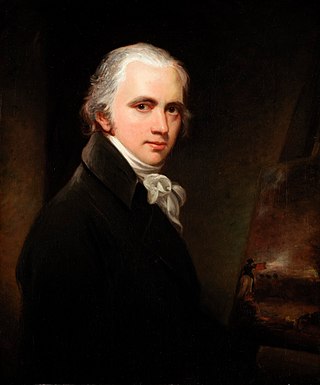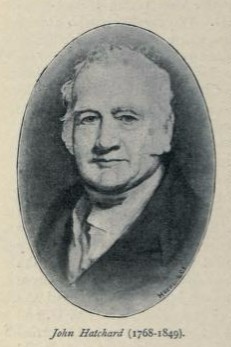
Charles Hatchett FRS FRSE was an English mineralogist and analytical chemist who discovered the element niobium, for which he proposed the name "columbium".
This article contains information about the literary events and publications of 1726.

Agnes Strickland was an English historical writer and poet. She is particularly remembered for her Lives of the Queens of England.

Sir William Beechey was a British portraitist during the golden age of British painting.

Richard Valpy was a British schoolmaster and priest of the Church of England. He is best known as the head master of Reading Grammar School, in the town of Reading, England.

Edward Pryce Lloyd, 1st Baron Mostyn, known as Sir Edward Lloyd, 2nd Baronet from 1795 to 1831, was a British politician.
The Cheap Repository Tracts consisted of more than two hundred moral, religious and occasionally political tracts issued in a number of series between March 1795 and 1817, and subsequently re-issued in various collected editions until the 1830s. They were devised by Hannah More and intended for sale or distribution to literate poor people, as an alternative to what she regarded as the immoral traditional broadside ballad and chapbook publications. The tracts proved to be enormously successful with more than two million copies sold or distributed during the first year of the scheme.
Events from the year 1726 in Great Britain.
Samuel Ralph Townshend Mayer (1841–1880) was a British journalist and writer, the founder of the Free and Open Church Association.

The Hon. Thomas James Twisleton (1770–1824) was an English churchman, Archdeacon of Colombo from 1815 to 1824. His early marriage has been considered a contribution to the use by Jane Austen of amateur theatricals as a plot device in her novel Mansfield Park. He was also noted as an amateur cricketer.
William Pickering was an English publisher and bookseller, notable for various innovations in publishing. He is sometimes credited with introducing edition binding in cloth to British publishing.

The Days of Yore is a British historical play by Richard Cumberland. It was first staged at the Covent Garden Theatre on 13 January 1796. The original cast included James Middleton as Alfred, King of England, George Davies Harley as Oddune, Earl of Devonshire, Alexander Pope as Voltimar, Elizabeth Clendining as Lothaire, James Thompson as Mollo, Willam Macready as Sibald, William Claremont as Ebert, Thomas Hull as Roger De Malvern and Elizabeth Pope as Adela. The work is set in the Anglo-Saxon era. The work was possibly influenced by Horace Walpole's gothic novel The Mysterious Mother. It ran for five performances.
Mackenzie Edward Charles Walcott (1821–1880) was an English clergyman, known as an ecclesiologist and antiquarian.
Joseph Clinton Robertson (c.1787–1852), pseudonym Sholto Percy, was a Scottish patent agent, writer and periodical editor. He was a political radical prominent in the early days of the working-class press in London, and in the debates within the Mechanics Institute movement.
Thomas Byerley (1789–1826), also known by the pseudonyms of Reuben Percy and Stephen Collet, was an English journalist and compiler of the Percy Anecdotes.

John Thomas Dicks (1818–1881) was a publisher in London in the 19th century. He issued popular, affordably priced fiction and drama, such as "shilling Shakespeares and wonderfully cheap reprints of Scott and other standard authors." Earlier in his career he worked with Peter Perring Thoms and George W. M. Reynolds. Employees included illustrator Frederick Gilbert. Readers included Thomas Burt and Havelock Ellis. Dicks retired in the 1870s, when his sons took over the firm which continued into the 1960s.
William Roxby Beverly or Beverley (c.1810–1889) was an English theatrical scene painter, known also as an artist in oils and watercolour. William John Lawrence, writing in the Dictionary of National Biography, considered him second only to Clarkson Stanfield among British scene painters of the 19th century.

John Hatchard (1769–1849) was an English publisher and bookseller, in Piccadilly, London. The Hatchards bookshop there is still in business.
George Luxford was an English botanist, printer and journalist.

Taxes on knowledge was a slogan defining an extended British campaign against duties and taxes on newspapers, their advertising content, and the paper they were printed on. The paper tax was early identified as an issue: "A tax upon Paper, is a tax upon Knowledge" is a saying attributed to Alexander Adam (1741–1809), a Scottish headmaster.










